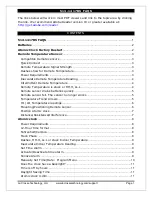
La Crosse Technology, Ltd. www.lacrossetechnology.com/support
Page 7
MOUNT
Option 1:
•
Install one mounting screw (not included) into a wall.
•
Place the remote sensor onto the screw (hanging hole on the backside).
•
Gently pull down to lock the screw in place.
Option 2:
•
Insert the mounting screw through the front of the remote sensor and into
the wall.
•
Tighten the screw to snug (do not over tighten).
Position Atomic clock
•
The atomic clock has a pull out stand to sit on a desk or table or can be wall
mounted.
•
Place within
of the remote sensor.
•
The maximum transmitting range in open air is 330 feet (100 meters).
•
Obstacles such as walls, windows, stucco, concrete and large metal objects
can reduce the range.
•
Choose a location 6 feet or more from electronics such as cordless phones,
wireless gaming systems, televisions, microwaves, routers, baby monitors,
etc., which can prevent signal reception.
•
Be aware of electrical wires and plumbing within a wall. This will interfere
with RF (radio frequency) signal reception.
Distance/Resistance/Interference
Distance:
•
The maximum transmitting range in open air is over 330 feet (100 meters)
between the remote sensor and the atomic clock. This range is in open air
with ideal conditions.
•
Consider what is in the signal path between the atomic clock and the remote
sensor.
•
Avoid placing electronics in the signal path between the atomic clock and the
remote sensor.
Resistance:
•
Obstacles such as walls, floors, windows, stucco, concrete and large metal
objects can reduce the range.
•
When considering the distance between the remote sensor and the atomic
clock (330 feet open air), cut that distance in half for each wall, window,
tree, bush or other obstruction in the signal path.
•
Closer is better.
•
Windows reflect the RF (radio frequency) signal.
•
Metal absorbs the signal and reduces the range.
•
Stucco has a metal mesh that absorbs the signal.
•
Do not mount the remote sensor on a metal fence. This significantly reduces
the effective range.






























